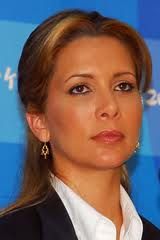
London 2012 clean Games in equestrian sports – No doping
FEI President HRH Princess Haya is proud to announce that London 2012 was a clean Games for equestrian sport, following confirmation that all human and equine samples taken during the Olympic equestrian events at Greenwich Park were negative.
“The FEI had a really steep mountain to climb after Athens and Hong Kong, but we had a clean Youth Olympic Games, a clean FEI World Equestrian Games and now we’ve crowned it with a clean Olympic Games in London,” Princess Haya said. “We knew that fair play and clean sport was the only way to produce top sport in the Olympic equestrian events and we are very proud that we have achieved that goal.
“The fact that all human and equine samples came back negative demonstrates the success of the FEI Clean Sport campaign, which has resulted in a major reduction in the number of positives in the Olympic disciplines over the past two and a half years.
“We had a rigorous and comprehensive testing programme in place. These were the most tested Games ever and we also tested for more substances than ever before. We worked hand in hand with the Horseracing Forensic Laboratory in Newmarket and thank them for the speed with which they processed all the Olympic samples so that we could maintain a level playing field throughout the Games.
“The equestrian community shouldn’t be thinking of this as a triumph; having a clean sport should be our normal day to day business, but now that we’ve had three major championships that were the most heavily tested ever and they were 100% clean, we can hold our heads up high and say that yes, this is a victory. We haven’t reached this point by resting on our laurels, there’s always work to be done and I am incredibly proud of the FEI’s performance over the four years since Hong Kong.
“This has been a real team effort, which was kick-started by the recommendations of the Clean Sport Commission headed up by Professor Arne Ljungqvist and the Stevens Commission, lead by Lord Stevens. The National Federations and the athletes and their support teams, as well as the team at FEI Headquarters have all played a major role in this success. Our community has really embraced the Clean Sport campaign.”
Professor Arne Ljungqvist, IOC Member and Vice President of the World Anti-Doping Agency (WADA), who chaired the FEI Clean Sport Commission, congratulated the FEI. “I am very happy to hear that the Clean Sport campaign has led to such a successful and clean Games and would like to congratulate the FEI,” he said. Professor Ljungqvist was on-site at Greenwich Park to watch the Individual Jumping Final on 8 August, the same day that IOC President Jacques Rogge attended the Olympic equestrian events.
Lord Stevens, who led the Stevens Commission that worked alongside the Clean Sport Commission, also attended the Olympic equestrian events. “To have totally clean Games at London 2012 is the best possible endorsement of the FEI’s Clean Sport campaign,” Lord Stevens said. “I wholeheartedly congratulate the FEI on this success which is due, in no small measure, to the huge amount of work that has been done on education within the equestrian community.”
Princess Haya credits the 2012 Olympic Games as the best ever for equestrian sport. “The London 2012 equestrian events were really incredible and Greenwich was a wonderful venue. We could not have wished for better sport and we now have a whole new fan base, which has to be the best legacy we could ask for. Now we have a duty to turn that fan base into new athletes so that our sport can continue to thrive and grow”, the FEI President said.
“We owe a huge debt of thanks to the whole LOCOG team, but particularly to the Equestrian Competition Manager Tim Hadaway and Venue General Manager Jeremy Edwards and their teams for all their devotion to the cause. And of course to all the wonderful volunteers. These were the best Games ever for equestrian sport.”
More human and equine testing took place at London 2012 than at any previous Olympic Games.
All medallists’ horses were tested, plus all fourth-placed horses. Random testing was also carried out, with horses being picked by computerised selection.
For human testing across the Games, all top four finishers, plus two other athletes selected at random, were tested by the IOC, along with other individuals selected at random.
